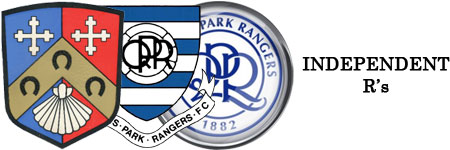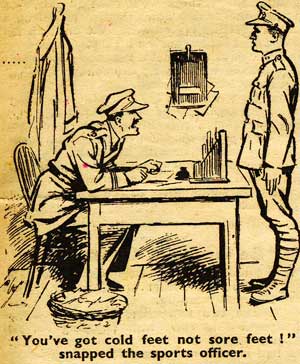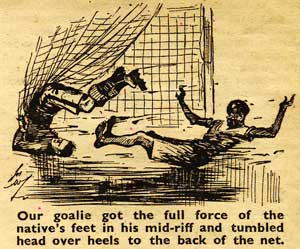In 2010 Colin Woodley sent me a superb newspaper article that appeared in ‘Football Weekly’ on 14th November 1936. This was part of a series titled: ‘From Soldier to Soccer Star’ and at the end of the article I questioned how many more articles there might have been in the series and whether anyone else had any of them?
Well, out of the blue the other day, and much to my delight, Paul Handley emailed me a copy of an earlier one in the series dated 24th October, 1936:
‘The third evening following my arrival in Jubbulpore saw the first replay in the cup-final between the 23rd Brigade and the Prince of Wales’ Regiment. The first one, you will remember, ended in a goalless draw after a thrilling struggle. Again I acted the role of spectator and once more, after another fierce fight, the players crawled off the field without a goal to reward their efforts.
“Crawled” is the word for it. Imagine the heat of an Indian evening, add to it cup-tie football of the do-or-die order, and the result is a mixture that spells “exhaustion”!
On account of the heat, the duration of football matches in India is limited to thirty-five minutes each way, which believe me, is quite enough! So far then, the teams had played for more than two hours without registering a point. Worse, they had to face a second replay.
I didn’t envy those fellows a little bit. If this match was typical of cup-tie football in India, well, I was quite content to sit around and clean my gun. And I said so.
“That’s all very well,” said a pal in my battery, “but after what you did last night (I had scored seven goals for my battery) you’ll click for the next replay, as sure as eggs is eggs!”
This fellow turned out to be a prophet. Sure enough, I was tackled on the following morning by the sports officer, who did his best to persuade me to take over the centre berth in the second replay.
But I was ready with a good one. I explained that I had only been in India a few days, that I was not yet used to the climate, and – best of all – my feet were terribly sore from the battery match thirty-six hours previously.
“But we’ve simply got to win this cup!” he barked.
“To do so, sir, you’ll need eleven sound men,” he insisted with emphasis on the “sound.”
“Bah! Jibbing because of your feet!” the officer snapped scornfully.
“I have nothing else to kick with, sir,” I said respectfully, but firmly. So I got away with it.
Well the second replay took place. And the third! Two pitched battles played on bullet-hard grounds. Still not a solitary goal. That cup final became a joke with the boys in Jubbulpore. Just think of it – no goals after nearly five hours of football! And what football!
Talk about thrills and excitement. Forwards charging down the field madly intent on getting the point that mattered. Defenders, dogged and determined, scotching every effort. Desperate tackles, goal-mouth scrambles, ball slamming and spinning all over the place – everywhere, in fact, but in the net. No goals! No goals! No goals! A joke – but not for the players concerned! They called ’em “The Teams That Couldn’t Score!” They sang songs about that cup-final, the tie that was always a tie! Legs were pulled and tempers frayed. Something had got to be done.
Came the fourth replay. I had taken part in one or two battery games and scored some more goals. Again I was hauled up before the sports officer.
“What about it?” he said, or words to that effect.
“Sore feet,” I replied.
“Cold feet” he retorted.
Maybe he was right. I was a soldier who had joined the British Army prepared – like any other soldier – to do his duty. I was ready to fight the enemy, if there was an enemy to fight. But I wasn’t anxious to poke my nose into an all-in everlasting scrap and get my leg pulled! No, sir!
The S.O. snorted, glared at me, and said something softly under his breath. I took it to be the signal to dismiss, and off I capered. But this time I didn’t get away with it. At two o’clock in the morning I was wakened by an orderly and told that I was to report on the football ground next day. I was to play for the Brigade in that never-ending cup-final. And that was an order!
It was also a nightmare. I lay awake pondering over the situation. The only solution seemed to be to get a goal and so end the business. But how?
At last I dozed off, only to dream of granite-hard grounds, and footballs that would persist in rebounding from uprights and crossbars!
Next day I turned up with the rest on the pitch. A large crowd had gathered to see the game. Well, I was in for it, and the only thing to do was to make the best of it. I’d score a goal – or bust! Soon we get down to it. It was – or, at least, it appeared to me to be – the hardest game of the lot. Ball going from end to end, every man jack of us tucked into the fray as though our lives depended on it, and one long roar from the crowd.
There wasn’t a moment’s peace until the “breather” which arrived with the now familiar 0-0. We were all pretty well whacked. A member of our side suggested humorously that we might treat our goalie to a couple of double Scotches, and so let our opponents get away with the cup; but the joke fell flat. We were too tired even to grin.
Midway through the second-half the miracle happened. I pounced on a loose ball near the half-way line, slipped past an opponent, then, in sheer desperation, slammed at the leather for all I was worth. I put everything I knew into that shot. The force of the kick strained my knee and sent me head-first to the ground.
But the ball sped like an arrow in its forty yards flight for goal. To my delight, it hit the back of the net with the goalie beaten all ends up! The 23rd Brigade had scored! We hung on grimly to that one-goal lead to the end. And so the marathon match was over at last. The cup was ours!
The kick which won the cup, however, put me out of action for six months. Not only was my knee badly strained, but in the resulting fall on the firm sand my leg suffered a nasty graze, and blood poisoning set in. Still, I didn’t care a jot. It was worth it.
When I was fit again I became a regular member of the brigade team, and in the following year we won the Wallace Cup with a goal average of 26-6. I had the luck to net eighteen of those goals. My three years stay in India brought me a total “bag” of 416 goals.
And while we are on the subject of goals, I would like to say that in Army football no one minds who scores so long as the side wins. At least, that is how I found it. Each member of the team is out to help the rest, which, after all, is the true football spirit.
Only once did I depart from the above policy and strive for a personal goal-scoring record, and then it was my team mates who put me up to it.
Our brigade was competing in the Harwood League in Bombay, where football is such a draw that gates frequently reach the 15,000 mark. We were told that there were gold medals for the league winners and runners-up, and a special prize of a gold watch and chain for the player who scored the most goals. That sounded pretty good to me, and as I had been rather successful as a marksman, the lads urged me to have a shot at that prize.
Well, we won the league, and I came out top in the matter of goals, netting seventeen in eight games. We were bucked, you can bet. Champions, with gold medals and all! We got quite a kick out of it. But there was another kick coming. Where were those blinkin’ medals? Where was my watch and chain?
No one seemed to know anything really definite about it. We made inquiries in official circles, and to our dismay were informed that the story about the medals and watch and chain was a hoax! No doubt the practical joker who first set the rumour on its rounds got quite a laugh out of the affair. Eleven angry soldiers sought unavailingly to track down this blighter. Had we laid our hands on him he’d have laughed the other side of his face!
The thing that surprised me most during my stay in India was the fine quality football served up by the locals. Except for the fact that in some cases ankle bandages were worn, the Indians always play with bare feet.
Given dry weather, these native elevens can make the best of our Army teams go all out. Their ball control on firm grounds is marvellous. It was on wet grounds that we had the Indians guessing. Bare-footed, they would slide and slither all over the shop, whereas our studs gave us a better foothold.
I shall never forget one incident. It was close on time, and the score was 1-1. It was anyone’s match, when suddenly the Indians broke away. The ball was centred, and a native forward made a dart at it. He slammed at the leather, missed it completely, fell backwards from the effort, and slithered with raised feet towards goal.
Our goalie got the full force of both feet in his mid-riff, and the impact sent him head-over-heels to the back of the net. Winded, and angry, the Tommy scrambled to his feet and clumped the Indian, who replied with another kick. Both men were ordered off, and in the minutes that remained we were lucky to keep our opponents out – so doubled up were we with laughter.’
Thanks again Paul, any more out there?
Steve Russell



Amazing that a second article should pop up. I keep looking for copies of the Football Weekly coming up for sale of that vintage but they are fairly rare.